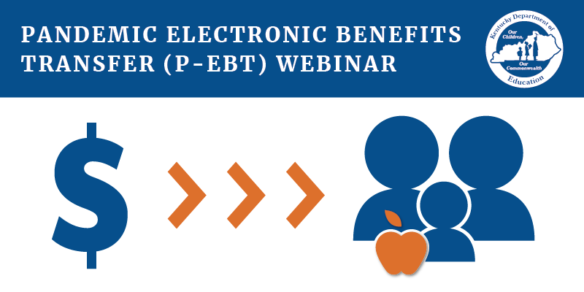
- Households eligible for P-EBT include those whose children attend public or private school and are certified to receive free or reduced-price school meals and children who attend schools that offer free school meals to all students.
- Timothy Cooper, assistant director of KDE’s Division of School and Community Nutrition, urged the food service directors and superintendents participating in the webinar to actively communicate with families about the program and the eligibility requirements.
By Jacob Perkins
Jacob.perkins@education.ky.gov
The Kentucky Department of Education’s (KDE) Division of School and Community Nutrition hosted a webinar May 29 on district responsibilities with the Pandemic Electronic Benefit Transfer (P-EBT) program.
The Kentucky Cabinet for Health and Family Services (CHFS) Department for Community Based Services (DCBS) and KDE have partnered to provide food assistance to families who have lost access to free or reduced-price school meals because of school building closures during the novel coronavirus (COVID-19) emergency.
The P-EBT program provides households an Electronic Benefits Transfer (EBT) card with benefits equal to the value of breakfasts and lunches a student was not able to receive during the days schools were closed. Households can use these benefits for grocery items eligible under the Supplemental Nutritional Assistance Program (SNAP).
Households eligible for P-EBT include those whose children attend a public or private school that participates in the United States Department of Agriculture’s National School Lunch Program and are certified to receive free or reduced-price school meals and children who attend schools that offer free school meals to all students. Even if a school was able to provide some meals during this period, a household is still eligible for P-EBT benefits.
P-EBT benefits are entirely federally funded and will provide up to $187 million in food assistance to up to 595,000 qualifying children. The plan will provide each eligible student with up to $313.50 for the time period of March through May to help with nutritional support during the time that schools have been closed during the pandemic.
If a family is approved for P-EBT in a month following March, they will receive benefits for the month in which they became eligible through May. The benefits will remain active for one year.
Timothy Cooper, assistant director of KDE’s Division of School and Community Nutrition, urged the food service directors and superintendents participating in the webinar to communicate with families about the program and the eligibility requirements.
Districts will need to provide families with the student’s Statewide Student Identification Number (SSID), as this will be required with the P-EBT application.
Students who are in households that already receive SNAP benefits or other CHFS Direct Certification Income Eligible Program Benefits will not follow the opt-in process because they should already be included in the P-EBT program.
“We have taken care of that for the families with the rationale being that these families have already signed up for a benefit in Kentucky. We treated that as their opt-in process,” said Cooper. “All of the children in the state that we were able to match to a current enrollment have already been given the benefit.”
If districts do send an SSID to one of these families and the family continues with the application process, the family will then see that they are denied because they already are receiving the benefit.
The SSID will be needed for families who choose to opt-in to the program. Each district should identify their own communication plans to provide SSID’s to their households.
Cooper said that the Division for School and Community Nutrition already has seen ideas from districts to provide information, including instructions for the program and SSIDs attached with report cards. Districts also could send direct emails to families about the program that would include the information needed to apply.
“The families need you to help them with the information,” said Cooper.
Visit the KDE P-EBT webpage for information. The webpage includes FAQs, as well as a customizable flyer that districts may choose to utilize to help communicate the program to their families.
The application process for new households begins June 1. The deadline for these applications is June 30. To apply for P-EBT, visit www.benefind.ky.gov.
Kentuckians applying for or awaiting benefits related to COVID-19 should be aware of scammers who may try to get your important personal information. Sensitive information sought by deceptive people includes Social Security numbers, bank information, EBT card numbers or PIN and more. No government agency will contact you asking for this information in order to approve your benefits unless you began the application process yourself. If you are unsure if a request is legitimate, contact the agency responsible for the benefits directly and report the scam to your caseworker.
FOR MORE INFO:
- Department for Community Based Services’ P-EBT Information
- Other DCBS Assistance Program or call (855) 306-8959
- Kentucky Department for Public Health’s COVID-19 webpage
- KDE’s COVID-19 webpage
- COVID-19 Hotline (800) 722-5725



Leave A Comment